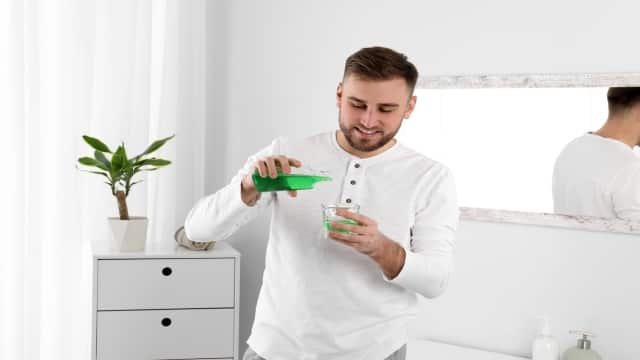Antimicrobial vs. Antiseptic vs. Antibacterial Mouthwash
When you see "antimicrobial," "antibacterial" or "antiseptic" on the label of a bottle of mouthwash, it's important to understand that those words aren't just there to impress you. They do have particular meanings. The Centers for Disease Control and Prevention defines antimicrobial products as those that are designed to kill or inactivate various kinds of microbes, which include fungi, bacteria, parasites and viruses.
Antibacterial agents (also known as antibiotics) kill, slow down or inactivate bacteria specifically. As Merck Manuals explains, the terms "antibacterial" and "antibiotic" are often used interchangeably. In the most technical sense, antibiotics are antimicrobial agents derived from bacteria or molds rather than other microorganisms. Antibiotics are designed to treat an active infection in or on the body, as the Microbiology Society points out, and they can be given topically or systemically.
In contrast, antiseptic products are typically spread over a specific area of the body to reduce the risk of infection, according to the Microbiology Society. While antibacterial products only target bacteria, antiseptic and antimicrobial agents can work against various types of microbes. So when it comes to antiseptic vs. antibacterial mouthwash, the former covers a broad spectrum of organisms, while the latter covers specific ones.
If you see antimicrobial, antibacterial or antiseptic listed on a bottle of mouthwash, you can be confident that the rinse is designed to inhibit microbes that could be harmful to your oral health.
How Do You Choose?
With so many mouthwash options out there, how can you choose the one that is right for you? It's helpful to talk to your dentist about using mouthwash if you are feeling any confusion. They can recommend a suitable mouthwash for your particular concerns, whether it's gum disease, dry mouth or bad breath. In some cases, a prescription mouthwash with antimicrobial properties might be your best option.
For example, if you have been dealing with gum disease, your dentist might prescribe a mouthwash containing chlorhexidine, which is an antiseptic agent that helps to control plaque and gingivitis, according to the American Dental Association (ADA). As the Mayo Clinic notes, chlorhexidine destroys the bacteria responsible for gum disease.
If you aren't as concerned with preventing gum disease, you may still benefit from using mouthwash. As the ADA outlines, mouthwash can help to improve your breath and reduce your risk of tooth decay.
If you have a particular concern, such as reducing plaque, fighting cavities or general breath-freshening, ask your dentist for advice on which product may help you achieve your goals. It's also a good idea to look for a product with the ADA Seal of Approval, which means that the product has provided scientific evidence demonstrating both its safety and efficacy.
Tips for Using Any Type of Mouthwash
Whether you end up getting a prescription for a mouthwash from your dentist or using an over-the-counter product labeled "antiseptic" or "antibacterial," there are some things to remember when using it. Mouthwash isn't designed to replace brushing and flossing, so be sure to continue to brush your teeth twice a day and floss once daily. The ADA assures you can use your mouthwash before or after brushing (depending on the instructions), but never skip brushing.
Another thing to remember is to follow the instructions listed on the mouthwash bottle or given by your dentist. You'll see the greatest benefit if you use the mouthwash, whatever type it is, exactly as directed.
This article is intended to promote understanding of and knowledge about general oral health topics. It is not intended to be a substitute for professional advice, diagnosis or treatment. Always seek the advice of your dentist or other qualified healthcare provider with any questions you may have regarding a medical condition or treatment.
ORAL HEALTH QUIZ
What's behind your smile?
Take our Oral Health assessment to get the most from your oral care routine
ORAL HEALTH QUIZ
What's behind your smile?
Take our Oral Health assessment to get the most from your oral care routine















